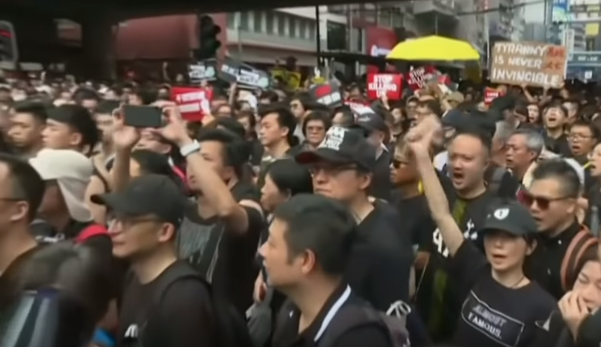Hong Kong—The residents of Hong Kong sent a clear message to Beijing at the elections on Sunday, November 24, with an overwhelming majority of votes going to pro-democracy candidates after more than five months of protests that have rocked the city.
Voters turned out in droves, with over 70 percent trooping to the polls, in comparison with only 47 percent in 2015. All in all, 2.94 million cast their votes on Sunday.
After 1pm on Monday, when the final results were tallied, the numbers were as follows: Of the 452 seats contested, 347 went to pan-democrat candidates, and 45 other seats went to independents, many of whom are also pro-democracy. Pro-establishment candidates won only 60 seats.
This means that pro-democracy groups now have control over 17 out of 18 of Hong Kong’s district councils, whereas before the elections, the pro-establishment camp had control of all 18. In Tai Po and Wong Tai Sin, the pro-democracy camp now has all elected seats, the South China Morning Post (SCMP) reports.
This also means that there is only one council controlled by pro-establishment faction—the Islands district—since 8 seats automatically went to pro-establishment rural chiefs.
Pro-democracy candidates won in both rich and poor districts, in areas rocked by protests as well as relatively quieter ones, and in the suburbs as well as downtown Hong Kong, SCMP added.
Some pro-establishment councillors who had lost their seats believe that it was the young, first-time voters who were catalysts for change.
Michael Tien Puk-sun, a veteran legislator, who lost his seat in Discovery Park, at the Tsuen Wan district, believes that his failure to get re-elected was because of new voters. He said that the government needs to listen to what the youth are saying.
“If that’s true, it means young people are no longer insensitive to politics,” he added.
Indeed, in her statement following the elections, Hong Kong’s Chief Executive Carrie Lam Cheng Yuet-ngor pledged to reflect on the message voters had sent.
“There are various analyses and interpretations in the community in relation to the results, and quite a few are of the view that the results reflect people’s dissatisfaction with the current situation and the deep-seated problems in society.”
The statement also said the government would “listen to the opinions of members of the public humbly and seriously reflect”.
Only 21 candidates from Hong Kong’s biggest pro-establishment party Democratic Alliance for the Betterment and Progress of Hong Kong (DAB) won in the elections. DAB had 179 candidates who had contested, and previous to Sunday’s elections had control over 119 seats.
The results have now put DAB, in terms of numbers, as the third-largest party on in Hong Kong’s district councils, trailing behind pro-democracy parties the Democratic Party, which won 91 seats, and the Civic Party, with 32 seats.
Significantly, as the pro-democracy parties won majorities on almost all of the district councils, the bloc will likely be given 117 seats on the election committee which chooses Hong Kong’s chief executive.
There are at least five activists from the Occupy Movement from 2014 who have won seats in Sunday’s poll. One winner, student activist Lester Shum, said, “The government must respond to our five demands as soon as possible. We can be happy for tonight and take a rest tomorrow, but we will need to keep up our fight the day after for the future of Hong Kong.”
The protesters five demands are as follows: 1) complete withdrawal of the extradition bill; 2) a retraction from the government of the characterization of the protests as “riots”; 3) the release and acquittal of protestors who had been arrested; 4) an establishment of an independent commission to investigate police behavior during the protests and 5) the resignation of the Hong Kong’s leader, Carrie Lam, as well as full freedom to elect the city’s Legislative Council and Chief Executive.
Other prominent Occupy winners are Jimmy Sham Tsz-kit, the convenor of the Civil Human Rights Front, still on crutches from a recent hammer attack, and Kelvin Lam, who ran in the place of student leader Joshua Wong after the latter was disqualified.
Mr Lam said, “The high turnout rate did benefit the pro-democracy camp. The result is like a referendum of the current administration, like a confidence vote.” -/TISG
Read related: Hong Kong leader vows to ‘listen’ as voters send sharp rebuke to Beijing
Hong Kong leader vows to ‘listen’ as voters send sharp rebuke to Beijing

